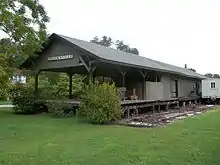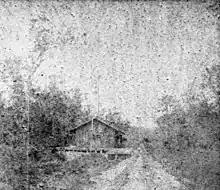| High Springs—Croom Line | |||
|---|---|---|---|
 | |||
| Overview | |||
| Other name(s) | Gainesville Subdivision, Ocala Subdivision | ||
| Status | Some segments still operating | ||
| Owner | Atlantic Coast Line Railroad | ||
| Termini | |||
| Technical | |||
| Line length | 128 mi (206 km) | ||
| Track gauge | 1,435 mm (4 ft 8+1⁄2 in) standard gauge | ||
| Electrification | No | ||
| |||
The Atlantic Coast Line Railroad's High Springs—Croom Line was a historic rail line in northern Florida. The line dates back to the late 1800s and was used for both passengers and freight.
Route description
The High Springs—Croom Line began at the Atlantic Coast Line's High Springs Yard, where it also connected with their DuPont—Lakeland Line. From High Springs, the line proceeded southeast to Gainesville and continued south through Ocala and Leesburg before reconnecting with the DuPont—Lakeland Line in Croom (originally known as Pemberton Ferry).[1]
Branches
From Croom, the line continued west another ten miles to Brooksville, which was classified separately on employee timetables as the Brooksville Branch.
The High Springs—Croom Line also connected with the Atlantic Coast Line's Palatka Branch just south of Gainesville at Rochelle. The Palatka Branch ran from Rochelle east to Palatka, where it connected with the Atlantic Coast Line's Main Line. The line's Micanopy Branch ran from the line to the small town of Micanopy and Tacoma. Further south, the High Springs—Croom Line also had a small branches to Citra and Howey-in-the-Hills and it also connected with the Leesburg Branch in Leesburg.
History
From High Springs to Gainesville, the line was built by Henry B. Plant in an effort to extend his railroad network further south to Charlotte Harbor. From Gainesville south, the line was built by the Florida Southern Railway. Henry Plant was unaware that the Florida Southern was building north to Gainesville and further north as he was building his line, the Live Oak, Tampa and Charlotte Harbor Railroad, south. To prevent having competing lines, Plant made a mutually beneficial deal with the Florida Southern that essentially combined the two lines into one, connecting them in Gainesville. The Florida Southern also The Florida Southern also built the Palatka Branch during their initial construction, as well as the branches to Micanopy and Citra. The Florida Southern Railway would eventually become part of the Plant System. After Plant's death, his network of railroads was sold to the Atlantic Coast Line Railroad (ACL) in 1902.[2]
Initially, the Atlantic Coast Line used the Palatka Branch to run trains from Jacksonville to the High Springs—Croom Line, which then went south to Ocala and Tampa. This changed in 1905 when the Atlantic Coast Line built a connection with the Jacksonville and Southwestern Railroad (J&SW), which the Atlantic Coast line bought a year prior. The Atlantic Coast Line then used the J&SW line, which crossed the High Springs—Croom Line at Burnett's Lake (just north of Gainesville), for trains from Jacksonville since it was more direct and went through more communities.[2][3]
The Atlantic Coast Line would sometimes refer to the High Springs—Croom Line as the "Florida Southern Route" (named after the predecessor that built the line) to differentiate it from their nearly parallel High Springs—Lakeland Line which was called the "West Coast Route" and was primarily a freight route.[3]
In 1948, the Atlantic Coast Line rerouted the line in central Gainesville from Main Street to instead run along 6th Street, where they built a new depot. This rerouted segment used the former right of way of the Gainesville and Gulf Railroad.[4]
For much of its history, the Atlantic Coast Line's West Coast Champion and an additional local passenger train ran the line round-trip daily on its route from Jacksonville to St. Petersburg. Trains continued to come in from Jacksonville via the Jacksonville—Wilcox Line at Burnett's Lake. By the 1950s, a local freight train was running the line from High Springs to Croom six days a week. A mixed train (with both passengers and freight) also ran the line from Burnett's Lake to High Springs six days a week.[1]
In 1967, the Atlantic Coast Line became the Seaboard Coast Line Railroad (SCL) after merging with its rival, the Seaboard Air Line Railroad (whose main line ran relatively close to the High Springs—Croom Line). In the Seaboard Coast Line era, both the High Springs—Croom Line and the Jacksonville—Wilcox Line were designated as the Ocala Subdivision. A local passenger train would continue to use the line up until 1971 when Amtrak took over the Seaboard Coast Line's passenger operations.[5][6]
By 1982, the Seaboard Coast Line abandoned the line from High Springs to Burnett's Lake, and track south of Micanopy Junction was broken up into segments.[7][8] By 1989, track was abandoned from Gainesville to Rochelle (along with the Palatka Branch east to Hawthorne).[9]
Current conditions
Some segments of the High Springs—Croom Line remain active today and some abandoned segments have since become rail trails.
Deerhaven Subdivision
Deerhaven Subdivision | ||||||||||||||||||||||||||||||||||||||||||||||||||||||||||||||||||||||
|---|---|---|---|---|---|---|---|---|---|---|---|---|---|---|---|---|---|---|---|---|---|---|---|---|---|---|---|---|---|---|---|---|---|---|---|---|---|---|---|---|---|---|---|---|---|---|---|---|---|---|---|---|---|---|---|---|---|---|---|---|---|---|---|---|---|---|---|---|---|---|
| ||||||||||||||||||||||||||||||||||||||||||||||||||||||||||||||||||||||
The short 13-mile segment of the line is still in service from Burnett's Lake south to Gainesville, where it terminates just north of central Gainesville at NE 23rd Avenue.[10] This line is now CSX's Deerhaven Subdivision and it is the only remaining rail line in Gainesville.[11] CSX uses the line for local freight and it is connected to the rest of CSX's network via the Brooker Subdivision at Burnett's Lake.
South of Gainesville
The Gainesville-Hawthorne State Trail runs on the former right of way between Gainesville and Rochelle.[12]
The line is still active between Lowell, Ocala, and Candler. This segment is operated by the Florida Northern Railroad, a shortline run by Regional Rail, LLC, which crosses the S Line in Ocala.[13]
A short segment was still active near Leesburg which had been operated by the Florida Midland Railroad since 1987 (this line also used former Seaboard track from Wildwood to Leesburg). This line was abandoned in late 2000.[14]
The Good Neighbor Trail runs on the former right of way between Croom and Brooksville.[15]
Historic stations
| Milepost[6] | City/Location | Station[1] | Image | Connections and notes |
|---|---|---|---|---|
| ARB 717.1 | High Springs | High Springs | .JPG.webp) |
junction with DuPont—Lakeland Line |
| ARB 724.7 | Alachua | East Alachua | ||
| ARB 726.4 | Burnett's Lake | junction with: | ||
| ARB 729.7 | Hague | Hague | ||
| ARB 736.0 | Paradise | |||
| ARB 739.0 | Teen Jay | |||
| ARB 740.1 | Gainesville | Gainesville |  |
original station on Main Street replaced with a new station on 6th Street in 1948. junction with:
|
| ARB 749.5 AS 737.5[lower-alpha 1] |
Rochelle | Rochelle | junction with Palatka Branch | |
| AS 743.1 | Micanopy Junction | junction with Micanopy Branch | ||
| AS 745.7 | Evinston | Evinston | ||
| AS 748.6 | McIntosh | McIntosh |  |
|
| AS 750.2 | Orange Lake | Orange Lake | ||
| AS 751.1 | Proctor | junction with Citra Branch | ||
| ASB 757.2 | Citra | Citra | located on Citra Branch | |
| AS 753.7 | Reddick | Reddick | ||
| AS 756.9 | Lowell | Lowell | ||
| AS 760.0 | Martin | Martin | ||
| AS 763.5 | Kendrick | Kendrick | ||
| AS 768.3 | Ocala | Ocala Union Station |  |
junction with Seaboard Air Line Railroad Main Line |
| AS 774.9 | Welchton | |||
| AS 781.2 | Candler | Candler | ||
| AS 785.2 | Ocklawaha | Ocklawaha | ||
| AS 787.7 | East Lake | |||
| AS 790.2 | Weirsdale | Weirsdale | ||
| AS 793.7 | Conant | |||
| AS 795.0 | Lady Lake | Lady Lake | ||
| AS 799.1 | Fruitland Park | Fruitland Park | ||
| AS 802.7 | Leesburg | Leesburg | junction with:
| |
| AS 808.3 | Okahumpka | Okahumpka | junction with Howey-in-the-Hills Branch | |
| ASF 816.2 | Howey-in-the-Hills | Howey-in-the-Hills | located on Howey-in-the-Hills Branch | |
| AS 816.9 | Center Hill | Center Hill | junction with Seaboard Air Line Railroad Miami Subdivision | |
| AS 821.5 | Webster | Webster | ||
| AS 826.6 | St. Catherine | St. Catherine | junction with Seaboard Air Line Railroad Main Line | |
| AS 833.1 | Pemberton Ferry | later renamed Croom junction with DuPont—Lakeland Line | ||
| AS 843.1 | Brooksville | Brooksville |  |
station still standing and is now a museum junction with Tampa Northern Railroad (SAL) |
| Milepost | City/Location | Station[1] | Image | Connections and notes |
|---|---|---|---|---|
| AS 698.6 | Palatka | Palatka |  |
rebuilt in 1908 junction with: |
| AS 703.0 | Francis | |||
| AS 710.5 | Hollister | Hollister | ||
| AS 715.8 | Interlachen | Interlachen | ||
| AS 719.9 | Edgar | Edgar | ||
| AS 728.7 | Hawthorne | Hawthorne |  |
junction with Seaboard Air Line Railroad Main Line |
| AS 733.3 | Grove Park | |||
| AS 737.5 | Rochelle | Rochelle | junction with High Springs—Croom Line | |
| Milepost | City/Location | Station[16] | Image | Connections and notes |
|---|---|---|---|---|
| ASA 743.1 | Micanopy Junction | junction with High Springs—Croom Line | ||
| ASA 746.5 | Micanopy | Micanopy |  |
|
| ASA 751.5 | Tacoma |
See also
Notes
- ↑ From Rochelle south, the milepost numbers continue from the Palatka Branch
References
- 1 2 3 4 Atlantic Coast Line Railroad Southern Division Timetable (1949)
- 1 2 Turner, Gregg (2003). A Short History of Florida Railroads. Arcadia Publishing. ISBN 978-0-7385-2421-4.
- 1 2 McFarland, Warren; Murdock, Ken (2017). "Memories of Burnett's Lake – Part 1" (PDF). Lines South. 34 (2). Retrieved 4 February 2023.
- ↑ "Gainesville's Railroads". Explore Historic Alachua County. Retrieved 6 August 2020.
- ↑ Seaboard Coast Line Railroad Jacksonville Division Timetable (1969)
- 1 2 Seaboard Coast Line Railroad Jacksonville Division and Tampa Division Timetable (1977)
- ↑ Seaboard Coast Line Railroad Jacksonville Division and Tampa Division Timetable (1982)
- ↑ "When Trains First Came to Central Florida". Tampa Bay Trains. Retrieved 7 August 2017.
- ↑ "Parcel: 19801-300-000". Alachua County Property Appraiser. Retrieved 2 November 2012.
- ↑ "Dupont, GA to Alachua, FL". Abandoned Rails. Retrieved 8 April 2020.
- ↑ CSX Jacksonville Division Timetable
- ↑ Gainesville-Hawthorne State Park Trail
- ↑ "Florida Central, Midland, and Northern Railroads". Pinsly Railroad Company. Retrieved 7 August 2017.
- ↑ "Surface Transportation Board Decision Document". Archived from the original on 2016-03-03. Retrieved 2022-11-03.
- ↑ Good Neighbor Trail
- ↑ "Florida Railroad: Passenger Stations & Stops" (PDF). Jim Fergusson's Railway and Tramway Station Lists. Retrieved 5 June 2020.